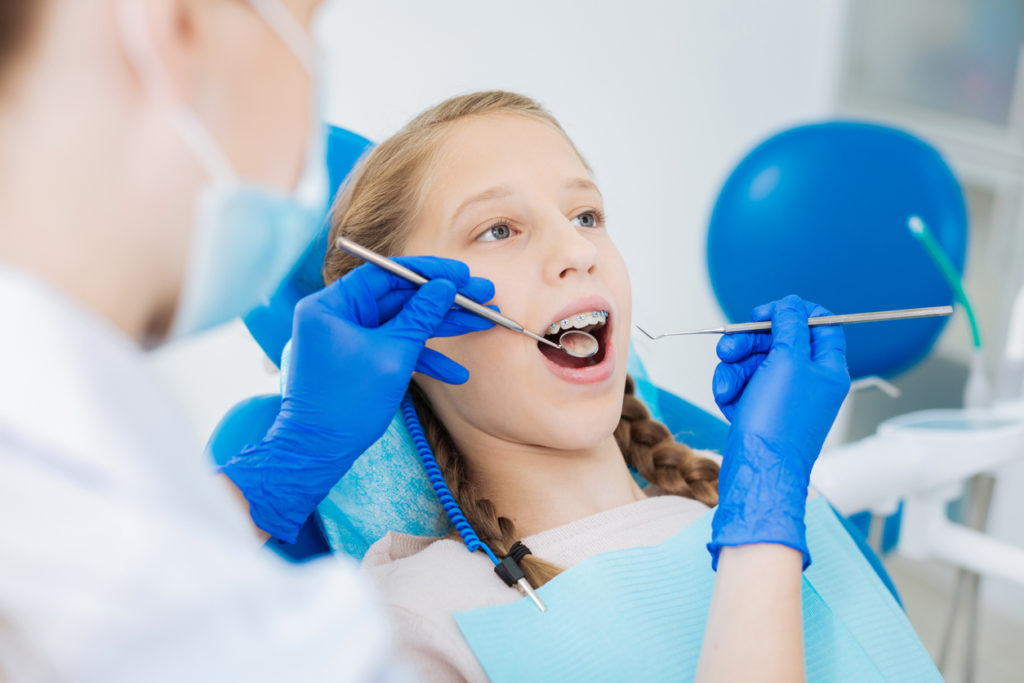This month of February we dedicate ourselves to raising awareness of the importance of developing good dental habits at an early age. Scheduling regular dental visits puts your children on the right foot to growing up with healthy teeth and gums. This goes hand in glove with any orthodontic treatment they may need to ensure they have straight teeth and a proper bite.
Orthodontic Problems Can Start at an Early Age
It’s not uncommon for parents to think that orthodontic problems only start after their child’s permanent teeth come in. But this is not the case. The child can begin to have problems even before their first primary teeth come in! Prolonged thumb sucking or pacifier use can exert force on the teeth and jaws. Be watchful if your child sucks a thumb, finger, or pacifier for a prolonged period of time as their teeth or jaw growth may be affected. In fact, some bone changes can occur in children as early as 18 months old. Common problems with prolonged thumb sucking or pacifier use include:
- Protruding front teeth
- Opened bite — the upper teeth do not overlap the lower teeth. This can create swallowing or speech problems.
- Cross bite — the upper teeth fit inside the lower teeth. This can cause the jaw to shift to one side and cause lopsided jaw growth.
When should you make your child’s first visit to an orthodontist?
Children should see an orthodontist by the time they turn seven years old to determine if and when they will need treatment. The first permanent molars and incisors usually come in by age seven. At this time we can see if crowding, cross-bites, or other problems are developing. However, if you see abnormal development of your child’s teeth, jaw, or facial structure, don’t wait. Schedule a visit with the orthodontist.
Orthodontic treatment can:
- Eliminate abnormal swallowing or speech problems
- Guide jaw growth
- Correct thumb-sucking
- Guide incoming permanent teeth
- Avoid impacted permanent teeth
- Eliminate the need for permanent tooth extraction
- Regulate upper and lower arch-width
- Make space for permanent teeth
McDonough OWLS Program (Orthodontic Wellness Program)
We have a special program for children ages 7-12. The program consists of regular complimentary visits for our young patients. Our OWLS program is the beginning of a healthy, beautiful, and lifelong smile. So when your child’s permanent teeth start coming in you can schedule a complimentary exam with our children’s orthodontist.
Dental Care While Wearing Braces
Patients who wear braces are more prone to gum disease. Braces consist of metal bands, wires, and brackets that are bonded to the teeth. With so many components, it can be challenging to clean hard-to-reach areas. As a result, plaque accumulates along the gum line and around the brackets. This increases the chance of gum disease.
5 TIPS TO PREVENTING GUM DISEASE WHILE WEARING BRACES
- Brush your teeth 4 times a day — after each meal and before you go to bed. When you brush, make sure to keep the brush at a 45 degree angle. This helps keep plaque from building up along the gum line. While you are wearing braces, replace your toothbrush every 2 months. The metal from the brackets wears down the toothbrush faster than usual.
- Flossing with your braces will help you get rid of food that may get trapped inside your braces and between your teeth. Colgate recommends that when flossing with braces, it is best to use waxed floss with a floss threader. This will help the floss slip between each tooth without catching on your braces. Gently slide the floss up into the gum line of both teeth before removing the floss and threader and going to the next tooth. Water flossers are a good solution to for flossing.
- Have a dental cleaning kit you can take with you when you leave home. A small makeup kit or small bag will work. Here’s what to put in it:
- a travel size toothpaste
- travel size mouthwash
- dental floss
- small mirror
- Keep your regular dental cleanings to remove plaque.
- Avoid hard, sticky foods that can damage your braces and eat a healthy diet. Proper nutrition and getting enough vitamins, especially vitamin C and vitamin D is vital for keeping your teeth healthy.
Sincerely,
Dr. David McDonough
McDonough Orthodontics

